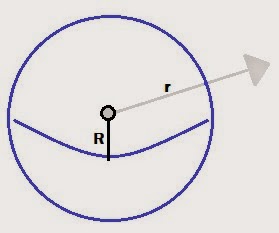HP Prime: Electric
Field & Flux (Gauss’s Law)
The program EFILED calculates the electric filed and flux
for five common fields:
Ring
Line or Wire of
Charge The radius of the Wire is small.
Sphere (non-conducting – uniform charge)
Plane
(Flat Sheet)
Cylinder
with the charge flowing through the ends
By Gauss’s Law, the general formula that of flux is:
Flux = q/ε0 = ∫ E dA
Where:
q = charge (in Coulombs)
ε0 =
8.85418781762 * 10^-12 F/m
E = electric field
dA = change of area, where A represents Area
HP Prime: EFIELD
EXPORT EFIELD()
BEGIN
// Electric Filed
& Flux
// EWS 2015-04-07
// SI Units ares
assumed
//
ε0=8.85418781762ᴇ−12_(F/m)
LOCAL
c,ef,sa,flux;
// ef: electric
field
// sa: surface
area
// flux = ef * sa
= q/ε
CHOOSE(c,"Elec.
Field/Flux",
{"Ring","Line/Wire
of Charge",
"Non-Conducting
Sphere",
"Plane","Cylinder"});
IF c==0 THEN
KILL; END;
// Ring
IF c==1 THEN
LOCAL ro,ri,a,q;
INPUT({ro,ri,a,q},"Elec.
Filed: Ring",
{"ro=","ri=","a=","q="},
{"Outer
Radius","Inner Radius",
"Point","Charge"});
ef:=q/(4*8.85418781762ᴇ−12*π*
((ro-ri)^2+a^2)^1.5);
sa:=π*(ro^2-ri^2);
END;
// Line/Wire of
Charge
IF c==2 THEN
LOCAL l,r,a,y,q;
INPUT({l,r,a,q},"Elec.
Field: Line",
{"l
=","r =","a =","q ="},{"Length of
Wire",
"Radius of
Wire","Distance from Wire",
"Charge"});
ef:=(q*a)/(l*4*8.85418781762ᴇ−12*π)
*∫((y^2+a^2)^−1.5,y,−l/2,l/2);
sa:=π*l*2*π;
END;
// Non-Conducting
Sphere
IF c==3 THEN
LOCAL R,r,q,p;
INPUT({R,r,q},"Non-Conducting
Sphere",
{"R
=","r =","q ="},{"Radius of Sphere",
"Radial
Point","Charge"});
IF r<R THEN
sa:=4*π*r^2;
p:=q/(4/3*π*r^3);
ef:=(p*r)/(3*8.85418781762ᴇ−12);
ELSE
sa:=4*π*R^2;
p:=q/(4/3*π*R^3);
ef:=(p*R^3)/(3*8.85418781762ᴇ−12*r^2);
END;
END;
// Plane
IF c==4 THEN
LOCAL A,q;
INPUT({A,q},"Elec.
Field: Plane",
{"A
=","q ="},{"Sheet Area","Charge"});
ef:=q/(2*8.85418781762ᴇ−12*A);
sa:=A;
END;
// Cylinder
IF c==5 THEN
LOCAL R,r,L,q,p;
INPUT({R,r,L,q},"Non-Conducting
Sphere",
{"R
=","r =","L =","q ="},{
"Radius of
Cylinder",
"Radial
Point",
"Length of
Cylinder",
"Charge"});
IF r<R THEN
sa:=2*π*r*L;
p:=q/(π*r^2*L);
ef:=(p*r)/(2*8.85418781762ᴇ−12);
ELSE
sa:=2*π*R*L;
p:=q/(π*R^2);
ef:=(p*R^2)/(2*8.85418781762ᴇ−12*r);
END;
END;
flux:=ef*sa;
PRINT();
PRINT("Electric
Field: "+ef);
PRINT("Electric
Flux: "+flux);
RETURN({ef,
flux});
END;
Eddie
This blog is property of Edward Shore. 2015




